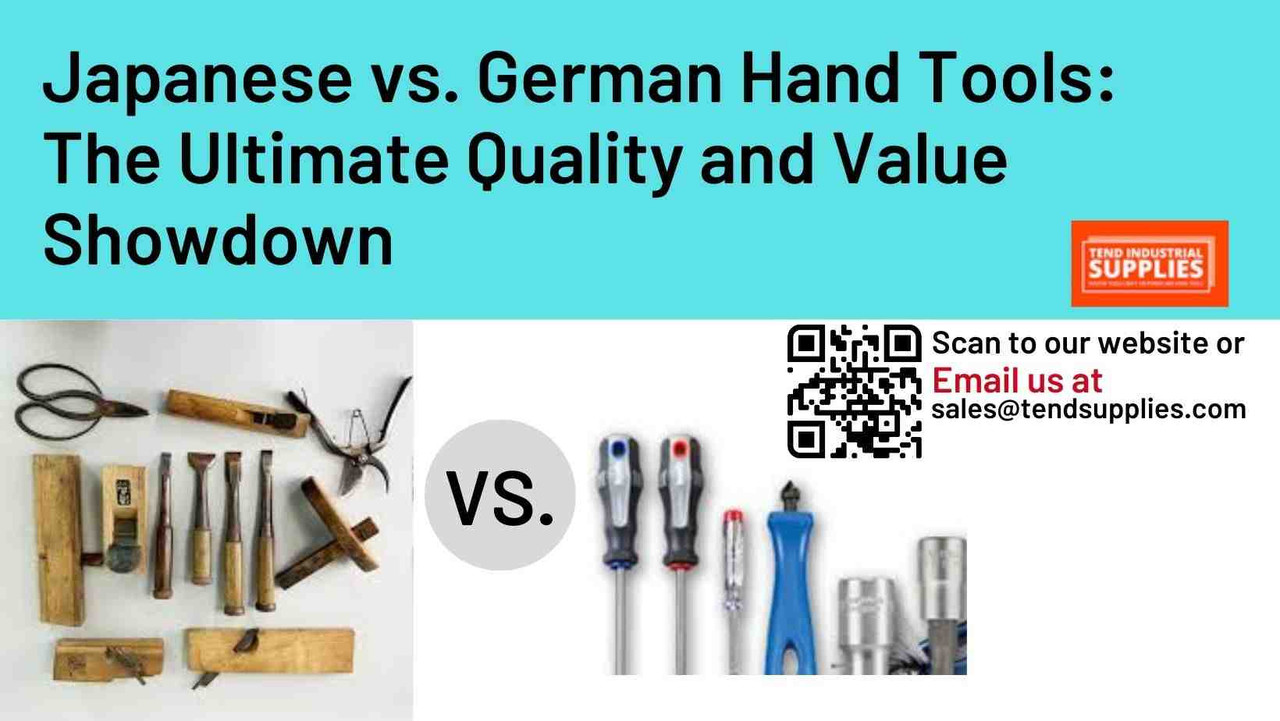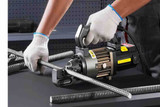Japanese vs. German Hand Tools: The Ultimate Quality and Value Showdown
Key Takeaway
Both Japanese and German hand tools offer exceptional quality, but they excel in different areas. Japanese tools are renowned for their precision, sharpness, and lightweight design, making them ideal for fine woodworking and detailed tasks. German tools, on the other hand, are celebrated for their durability, versatility, and ergonomic designs, perfect for heavy-duty use and general purpose work. The best choice depends on your specific needs, budget, and the type of projects you typically undertake.
Introduction
When it comes to hand tools, two nations stand out for their exceptional craftsmanship and quality: Japan and Germany. Both countries have a long-standing tradition of producing top-tier tools, but they often approach tool-making with different philosophies and strengths.
Japanese and German manufacturers have earned global reputations for their exceptional quality, precision, and durability. Japanese tools are often celebrated for their meticulous craftsmanship, lightweight design, and razor-sharp edges, making them a favorite among woodworkers and artisans who value finesse and attention to detail. On the other hand, German tools are renowned for their robust construction, ergonomic design, and long-lasting performance, their power tool is ideal for heavy-duty tasks and professional applications. The ultimate quality and value showdown between these two powerhouses boils down to the specific needs of the user: those seeking precision and finesse might lean towards Japanese tools, while those who prioritize durability and reliability might opt for German brands. In the end, both offer unparalleled value, and the choice often comes down to personal preference and the demands of the job at hand.
In this comprehensive guide, we'll dive deep into the world of Japanese and German hand tools, comparing their quality, value, and suitability for various tasks.
Japanese Hand Tools: Precision and Tradition
Characteristics of Japanese Tools
- Exceptional Sharpness: Japanese tools, especially cutting tools like chisels and saws, are known for their incredibly sharp edges.
- Lightweight Design: Many Japanese tools are designed to be lighter, reducing user fatigue during prolonged use.
- High-Quality Steel: Japanese toolmakers often use high-carbon steel, known for its ability to hold a sharp edge.
- Traditional Craftsmanship: Many Japanese tools are still hand-forged using centuries-old techniques.
Popular Japanese Tool Types
- Chisels (Nomi)
- Hand Planes (Kanna)
- Saws (Nokogiri)
- Hammers (Genno)
Pros of Japanese Tools
- Unparalleled precision for fine woodworking
- Excellent for detailed, intricate work
- Lightweight, reducing user fatigue
- Often hand-crafted with meticulous attention to detail
Cons of Japanese Tools
- Can be more expensive than their Western counterparts
- May require more maintenance (e.g., regular sharpening)
- Some may find the traditional designs less familiar or comfortable
German Hand Tools: Durability and Innovation
Characteristics of German Tools
- Robust Construction: German tools are built to last, often featuring sturdy designs and durable materials.
- Ergonomic Design: Many German tools focus on user comfort and reduced strain during prolonged use.
- Precision Engineering: German tools often incorporate advanced manufacturing techniques for consistent quality.
- Versatility: Many German tools are designed to handle a wide range of tasks effectively.
Popular German Tool Types
- Pliers and Cutters
- Screwdrivers
- Wrenches
- Measuring Tools
Pros of German Tools
- Exceptional durability and longevity
- Ergonomic designs for comfortable use
- Often more versatile for various tasks
- Generally require less maintenance
Cons of German Tools
- Can be heavier than Japanese counterparts
- May not achieve the same level of sharpness as Japanese cutting tools
- Some specialized tools can be expensive
Quality Comparison
When it comes to quality, both Japanese and German tools are at the top of their game, but they excel in different areas:
- Precision Work: Japanese tools generally have the edge for ultra-precise tasks, especially in woodworking.
- Durability: German tools often win out in terms of overall durability and ability to withstand heavy use.
- Edge Retention: Japanese high-carbon steel tools typically hold their edge longer but may be more prone to chipping.
- Consistency: German tools, with their advanced manufacturing processes, often offer more consistent quality across their product lines.
Value for Money
Determining value depends on your specific needs and usage:
- For Fine Woodworking: Japanese tools, despite their higher price, often provide better value for those focused on precision woodworking.
- For General Use: German tools typically offer excellent value for general purpose and heavy-duty tasks.
- Long-Term Investment: Both Japanese and German tools can be considered long-term investments due to their quality and longevity.
- Maintenance Costs: Factor in the potential need for more frequent sharpening and careful maintenance of Japanese tools.
Choosing Between Japanese and German Tools
Consider these factors when making your choice of Hand tools:
- Type of Work: Fine, detailed work favors Japanese tools, while heavy-duty tasks are better suited to German tools.
- Personal Preference: Some users prefer the lightweight feel of Japanese tools, while others appreciate the robust nature of German tools.
- Budget: While both can be expensive, you may find more mid-range options with German tools.
- Maintenance Willingness: If you enjoy tool maintenance and sharpening, Japanese tools might be more satisfying.
- Availability: Consider the availability of tools and replacement parts in your area.
Popular Brands to Consider for Hand tools
German Brands:
- Gedore
- Hazet
- Heyco
- NWS
- Picard
- Stahlwille
- Wera
Japanese Brands:
- Shinano
Frequently Asked Questions
1. Are Japanese hand tools suitable for beginners?
While Japanese tools can be excellent for beginners interested in fine woodworking, they may require more skill to use effectively and maintain. Beginners might find German tools more forgiving and versatile to start with.
2. Do German tools require less maintenance than Japanese tools?
Generally, yes. German tools are often designed for durability and ease of maintenance. Japanese tools, especially cutting tools, may require more frequent sharpening and careful handling.
3. Can I use Japanese woodworking tools for Western-style woodworking?
Absolutely! While some techniques might differ, many woodworkers successfully incorporate Japanese tools into Western-style woodworking for their precision and performance.
4. Are German tools always more expensive than other brands?
Not necessarily. While premium German brands can be pricey, many offer mid-range lines that compete well on price with other quality tool brands.
5. How do I care for my Japanese hand tools to ensure they last?
Keep them clean and dry, oil metal parts to prevent rust, store them properly (especially cutting edges), and maintain sharp edges with proper sharpening techniques.
Related Article
Types of Hand Tools for Every Job and Every Workshop
Conclusion
Both Japanese and German hand tools offer exceptional quality and value, each excelling in their own areas. Japanese tools are the go-to choice for precision work and fine craftsmanship, particularly in woodworking. German tools shine in durability, versatility, and ergonomic design, making them excellent for a wide range of tasks and heavy-duty use.
Ultimately, the best choice depends on your specific needs, the type of work you do, and your personal preferences. Many professionals and serious DIY enthusiasts find that a combination of both Japanese and German tools in their toolkit provides the best of both worlds, allowing them to tackle any project with the right tool for the job.
Ready to elevate your toolkit with premium Japanese or German hand tools? Visit Tend Industrial Supplies for an extensive selection of top-quality tools from renowned manufacturers. Whether you're looking for the precision of Japanese craftsmanship or the durability of German engineering, we have the perfect tools to meet your needs.
Need expert advice on choosing between Japanese and German tools for your specific projects? Our knowledgeable team is here to help. Contact us at sales@tendsupplies.com for personalized recommendations and support. Invest in quality tools that will serve you well for years to come. Explore our Japanese and German tool collections today and take your craftsmanship to the next level!









